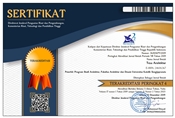PENGARUH MITOS PADA BENTUKAN RUANG BERMUKIM DI DESA NGADAS KECAMATAN PONCOKUSUMO KABUPATEN MALANG (Myth Effect on Living Space Formation at Ngadas of Pondokusumo Sub-District, Malang District)
Abstract
Keywords
Full Text:
PDFReferences
Abdullah, Taufik. 1988. Mitos, Kewibawaan dan Peri/aku Budaya. Jakarta: Pustaka Grafika Kita.
Awang, Hashim. 1986. Glosari Mini Kesusasteraan. Petaling Jaya: Penerbit Fajar Bakti.
Barthes, Roland. 1981. Mithologies. New York: Granada Publising
Beatty, Andrew. 2001. Variasi Agama di Jawa: Suatu Pendekatan Antropologi. Jakarta: PT. Raja Grafindo Persada.
Boland, B.J. 1982. The Strunggle of Islam in Modern Indonesia. Den Haag: Martinus Nijhoff.16 el Harakah Vo'14 No.1 Tahun 2012 Mitos, Sakral, dan Kearifan Lokal (Maksudnya bagaimana ?)
Bowie, Fiona. 2000. The Anthropology of Religion, an Introduction. Oxford: Blackwell Publisher.
Hefner, Robert W. 1985. Hindu Javanese: Tengger Tradition and Is/am. Princeton: Pricenton University Press
Gove, B.P, et.a. ed. 1986. Webster's Third New International Dictionary of The English Language Unabridged. Springfield, Massachusetts: MerriamWebster Inc
Jayadinata, Johara T. 1999. Tata Guna Lahan dalam Perencanaan Pedesaan Perkotaan dan Wi/ayah. Bandung; Ganesha ITB.
Koentjaraningrat, 1985. Pokok-pokok Antropologi Sosial. Jakarta: Dian Press.
Nirarta, Samadhi T. 2004. Peri/aku dan Pola Ruang, Lembaga Penelitian Dan Pengabdian Masyarakat. Malang: Jurusan Teknik Planologi ITN Malang.
Sudiyat, Iman. 1983. Hukum Adat, 8ketsa Azas (Adat Law, Sketch of Principles). Yogyakarta: Liberty.
Wisadirana, Darsano. 2005. 80siologi Pedesaan: Kajian Kultural dan Struktural Masyarakat Pedesaan. Malang: Penerbit UMM Press.
DOI: https://doi.org/10.24167/tesa.v11i1.220
ISSN 1410-6094 (Print) | ISSN 2460-6367 (Media Online) | View My Stats

This work is licensed under a Creative Commons Attribution 4.0 International License.








